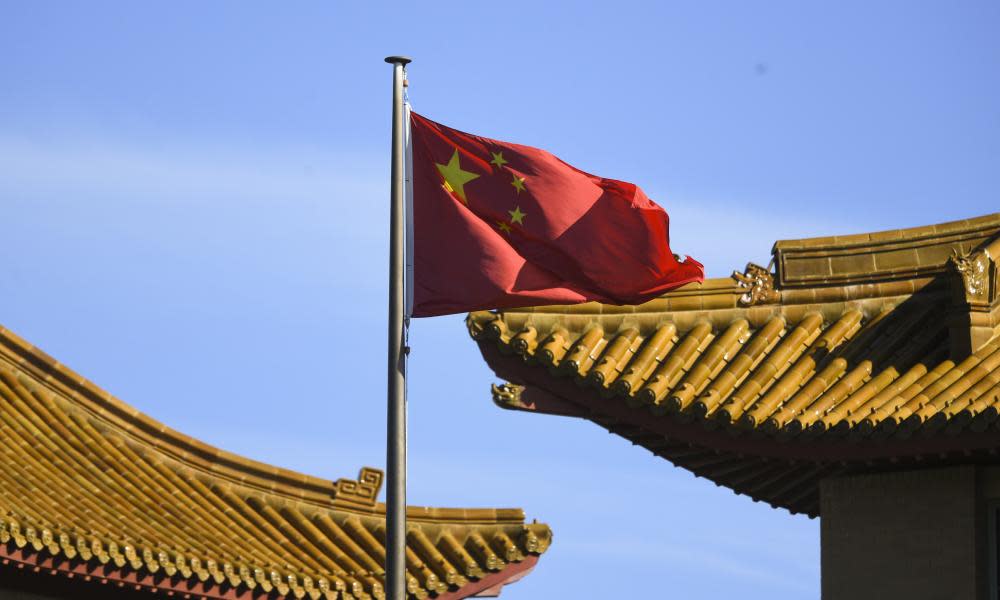'Double-bind': Chinese-Australians face difficult times as tensions grow

Two Chinese-Australians questioned about their allegiances while giving evidence to a parliamentary committee this year say the furore over an offensive war crimes tweet signifies a troubling increase in tribalism.
In October, Yun Jiang and Osmond Chiu, along with Wesa Chau, were asked by Liberal senator Eric Abetz to unconditionally condemn the Chinese Communist party during a Senate inquiry which was investigating issues affecting diaspora communities in Australia.
Jiang, who writes about China for Australian National University, and formerly worked at the Department of Prime Minister and Cabinet, said she was perplexed as to why the tweet had gathered so much attention.
Related: Morrison asks for dialogue with China as other countries pledge support for Australia
The tweet, from the account of China’s foreign ministry spokesman Zhao Lijian, showed a doctored image of an Australian soldier holding a knife to the throat of an Afghan child.
The prime minister, Scott Morrison, described it as repugnant and demanded an apology, and several Australian allies – including the US, France and New Zealand – backed his approach.
In Australia, Jiang said the backlash over the tweet illustrated the increasing challenges for those with Chinese heritage in Australia.
“Chinese-Australians are basically in a double bind,” she said.
“There’s a lot of diversity within the Australian-Chinese community, of course. But there’s a sense with the escalating rhetoric that if you don’t support the Australian government perspective, you’re supporting China.
“There is [also] a problem that there are people who argue for a more nuanced response or a considered debate that are painted as an apologist for the CCP.”
Chiu, a research fellow at the Per Capita thinktank, said the reaction to the tweet, like the questioning he was subject to by Abetz, reinforced propaganda that could be used against Australia.
He said this was a product of having two different debates about China – one relating to domestic affairs, and the other about geopolitics – at the same time.
“When it comes to the Australia-China relationship, we keep trying to have two very separate conversations in parallel,” he said.
“One is more focused on domestic politics while the other is internationally focused and geopolitically minded. Increasingly these two different conversations keep crashing into each other and [that] is not without a cost.”
The tweet came during a low-point in diplomatic relations, amidst an escalating trade dispute and with Australian authorities continuing to crack down on Chinese foreign interference, including using new national security laws for the first time to charge a Melbourne man last month.
On the Chinese social media platform Wechat, which censored posts about the tweet made from Morrison’s account this week, Chinese-Australians debated the deteriorating relationship between the countries.
Australia’s most popular Chinese language Wechat account, Sydney Today, published an exclusive with comments from several Chinese Australians in the aftermath of the graphic post.
A screenshot of a statement sent to a Sydney Today reporter by Liberal MP Gladys Liu reads: “Ms Liu condemns the photo by Zhao Lijian in the strongest terms. It is offensive and not representative of the highly respected Australian Defence Force. Ms Liu is fully supportive of the Prime Minister’s demand for an apology from the Chinese government.
“The entire Australian Government, all sides of politics, are supportive of the Prime Minister in this matter.”
A former Chinese diplomat now living in Australia, quoted under the pseudonym of Michael Song, said Zhao was only a deputy secretary level member of the CCP and it was unnecessary for Morrison to engage with him.
“Zhao is a diplomatic representative of the wolf warriors, his style is like Trump,” Song said. “Australia doesn’t compete head on with Trump, there’s no need to compete head on with the Chinese Ministry of Foreign Affairs.”
Song said that Australia faces an uphill battle in the trade war, as China was both the buyer and an emerging superpower that would use Australia as an example for other nations.
“Both countries are now desperate to save face, but Australia will lose more.”
For the Chinese readership of Sydney Today, the reaction has been mixed, some defending the tweet and describing Morrison’s chosen response as “childish” and “emotionally fragile”.
Others were more blunt: “Yes the image was wrong. It was two boys they killed.”
This is a reference to an unproven claim included in the Brereton report that Australian soldiers cut the throats of two 14-year-old boys who were suspected of being Taliban sympathisers.
Several readers also disparaged China’s diplomatic tactic as “picking on the weak” by targeting Australia and accused China of covering up its own human rights abuses.
Related: Democracy wine: politicians worldwide pledge to drink Australian wine in stand against China
One commenter wrote: “Has China ever apologised? What right does it have to ask for an apology?”
Xu Yaohan, a Chinese-Australian lawyer who runs a local Wechat group, said members of the Chinese-Australian community are the ones caught in the crossfire of Beijing and Canberra’s “information wars”.
“The Chinese people living in Australia are innocent in all this,” Xu said.
“My primary concern is how the Australian government is going to support the Chinese-Australian community and lessen the burden and hurt they’ve suffered.
“Because when relations were sweet as honey between Australia and China, the Chinese-Australian community were the ones who made contributions.”


